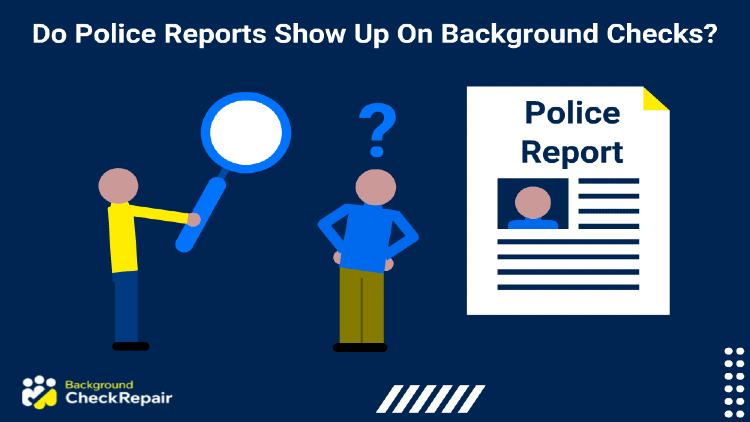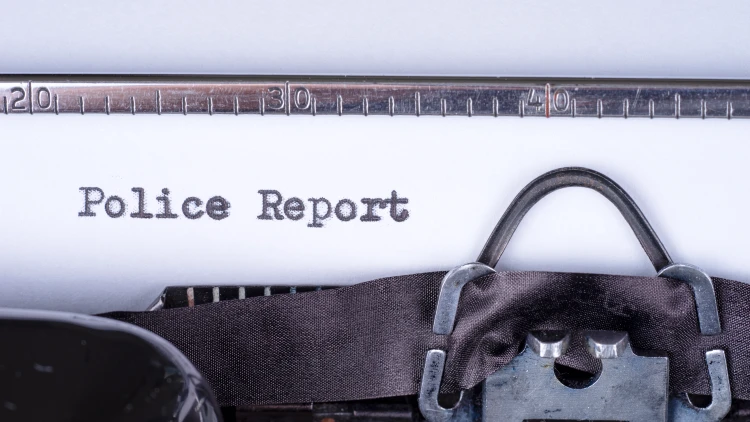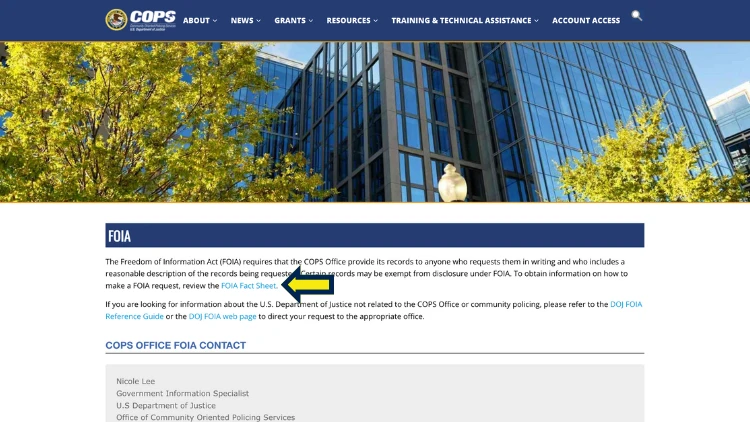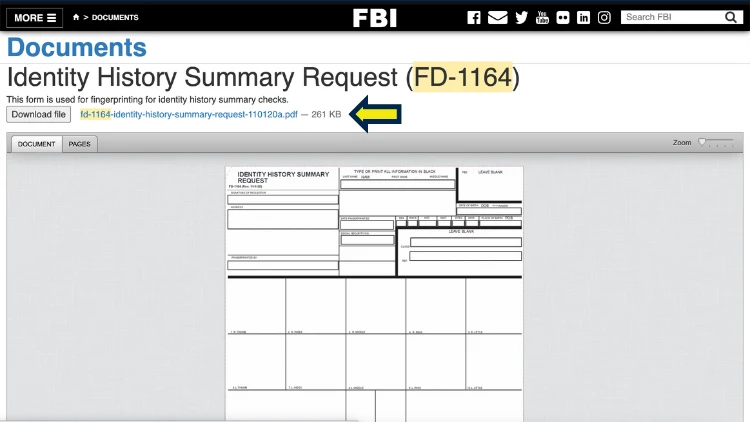We use cookies to ensure that we give you the best experience on our website. If you continue to use this site we will assume that you are happy with it
Do Police Reports Show Up on Background Checks? Yes and No
 Written by Background Check Repair
Written by Background Check Repair
Background Checks | May 13, 2024

Table of Contents
When do police reports show up on background checks? The answer to that question might be yes, or no, because it depends on the depth of the background check being requested, as well as other factors.
Police reports, like other criminal records, are usually publicly available. Background checks do not differentiate between police reports or incidents that were dismissed versus those that resulted in convictions.
Police reports are public records, which means they can be requested through the federal Freedom of Information Act (FOIA) and state open record laws. However, whether police reports will pop up on a background check depends on the kind of criminal incident involved and whether it is still under investigation.
Of course, where there are criminal records, background investigations are likely to find them. But depending on the type of check someone is requesting, some police reports will not be reported.
Most background checks that are run simply consist of identity verification and regional criminal records search. If a report is not in the records system, it will not be revealed in such background checks.
The following guide outlines when police reports show up on background checks, and what your rights are for privacy and equal opportunity.
Will a Background Check Reveal Police Reports and Criminal Records?
Criminal records show convictions for felonies, misdemeanors, or other infractions of the law. In most cases, if police discover a crime and do not charge an individual, there is no criminal record of that incident. So, do police reports show up on background checks? Maybe. Detectives are required to file police reports if they have contact with criminal offenders, but many factors can determine whether or not the report shows up on a background check.

The following information is considered public record but does not often emerge in basic background checks:1
- Police arrests that did not result in a conviction.
- Court records that have been expunged.
- Investigations that did not lead to prosecution, such as when there is insufficient evidence linking a suspect to a crime.
Although it is illegal under the Fair Credit Reporting Act (FCRA) for a company to report criminal records that have been expunged, many free background check websites do not follow this law. In fact, reports from these companies may oftentimes still be found online even if they were removed from the website itself (if you find this type of abuse report abuse as unauthorized use of your personal information with the Federal Trade Commission). Most reputable services will not have this info.
Although it is possible to expunge a record of arrest or criminal case, this does not mean that the incident will not impact employment, housing options, or other opportunities. And even if it doesn’t emerge on a background check, you still have to disclose the information under certain circumstances. For example, state and federal applications may request that you list previous arrests. This might include applications for federal employment, adoption, or immigration.
Do Police Reports Show Up On Background Checks: Federal vs. State
Police reports can appear in investigations, depending on whether they were initiated at the federal level or the state level. Federal agencies such as the FBI, Drug Enforcement Agency, and Bureau of Alcohol, Tobacco, Firearms and Explosives maintain their own data. State-level agencies that collect criminal history information usually send the data to an electronic repository managed by the FBI.

(Image: U.S. Department of Justice5)
But even though state law enforcement officials may have access to this database, not all states participate in it. Some states also do not participate in sharing information through national databases.
Does a Criminal Background Check Show an Arrest Record?
Criminal background checks typically do not include arrests that did not lead to a conviction (though this is not always the case). Arrest data can be accessible to the public in many jurisdictions, and this information is often used by private companies when conducting thorough inquiries. Due to the fact that arrests are not convictions, they can be removed under state laws.
To answer the question – do police reports show up on background checks? A reputable background check company will not include arrests or police reports in a background check unless they have led to a conviction in order to comply with federal Equal Employment Opportunity laws.2
However, this does not mean an arrest cannot be found with a FOIA request or through official county and state criminal databases. The extent to which arrest reports remain publicly available depends on the nature of the arrest and the state where it occurred.
Law enforcement agencies maintain different types of records for incidents that do not lead to a conviction, such as:
- Police reports that don’t qualify as criminal records.
- Information about arrests that were expunged.
- Criminal records that have been sealed by the courts.
Police reports can be requested through FOIA and may be revealed on background checks if they were not expunged. If you’re wondering whether an arrest record will be exposed on a background check, it’s best to talk to a lawyer or your local law enforcement agency.
It can be a criminal offense if you fail to disclose information regarding arrests or convictions when required. (Arrest records are an excellent way to determine the reason for someone’s arrest.)
For example, arrest records have to be disclosed when applying for certain occupations including security guard jobs, teaching positions, and federal employment. If an arrest has been expunged and the court ordered the record to be removed from public access, the information will not be revealed in a background check.
Both public and private employers can gain access to criminal history reports, including police reports that did not lead to a conviction. However, it is illegal for an employer or other agency to use this type of information in denying your application unless the law specifically permits it. If you are the victim of discrimination because of report inaccuracies, report abuse report other issues, or file a complaint with the Federal Trade Commission.
What Will Appear on an FBI Background Check?
One of the best ways to find out if someone has a criminal case in their past is by checking he FBI database with an Identity History Summary (rap sheet). If convicted of a crime, this will be revealed at the federal level. The FBI may also provide driving records which can include prior DUI and major traffic code violations.
Arrests that did not lead to convictions will not be revealed on an FBI investigation if the charges were brought more than 7 years ago. However, a pending criminal case may be exposed in an FBI inquiry and will remain visible until the case is closed.3
The Federal Bureau of Investigation utilizes its National Instant Criminal Background Check System (NICS) for screening applicants applying for federal licenses and employment. The NICS system also screens those who wish to obtain firearms from dealers.

(Image: FBI6)
Depending on the nature of your inquiry, you can submit requests directly to the FBI or through other law enforcement agencies that participate in sharing information with the national database. The FBI usually processes these requests within 30 days, but they can take longer if the request is complex.
What’s the extent of an FBI background investigation?
The scope of inquiries vary depending on the agency conducting it and the reason a candidate is being screened. However, in accordance with the laws of most states, including California, an FBI background search cannot exceed 7 years. There are exceptions, based on state law and salary, for the length of time searched in a thorough records check.
With a firearms license, even if inquiries fall within the 7-year limit, certain expunged records may resurface and disqualify an applicant. This is why it’s important to disclose all past criminal records when applying for federal licenses and permits regardless of whether or not this information may pop up on a report.
To summarize, an FBI history inquiry does not include the following:
- Arrests without convictions prior to 7 years.
- Criminal charges that have been expunged.
- Unfounded accusations or allegations of criminal activity.
If you are concerned about the possibility of a crime showing up on your criminal record, it’s best to consult a defense attorney who specializes in information on criminal services. You may also consider sealing criminal records by filing for expungement.
Does a Fingerprint Background Check Include Arrest Reporting? (How Long Do Fingerprint Records Stay on File?)
Adult criminal history lasts forever, and can stay on file for life, but can this type of background check include prior arrests? Through a fingerprint background check, information about a person can be retrieved from the FBI’s Integrated Automated Fingerprint Identification System (IAFIS). This is comprised of data from police departments and other law enforcement agencies. A fingerprint check can include information about arrests without convictions as well as those that have been expunged because these checks are almost exclusively used by law enforcement when detaining suspects.
Generally, when people refer to a fingerprint check, they are talking about a Level 2 records check. Although prior crimes may emerge on a fingerprint background search for law officers, they will not be included in a name-based search that is typically done for employment purposes (Level 1 Background Check). Although most criminal background investigations do not include this type of search, (unless they are being done for healthcare, public education, and other government positions), some employers may opt to obtain a fingerprint criminal record search (Level 2 Check) if there is reason to believe that an interviewee has undisclosed arrests in their background.
One advantage of fingerprint resources is the scope of information they provide. This includes arrests for serious crimes like rape, murder, and drug trafficking even if the charges did not result in a conviction. However, these reports do not look into traffic or misdemeanor offenses. Fingerprint checks are often the most accurate because a fingerprint is unique and more difficult to change than a name or other identifying information, which is why they are used by authorities.
Reporting of criminal records, for employment on a level 2 check, generally does not exceed 7-10 years due to state laws that restrict background screenings. However, criminal records do not expire and the fingerprints collected will remain. Even if an arrest or court record has been removed, the fingerprints will not be destroyed. There are no federal laws limiting how long fingerprints can be retained.
What Will a Background Check Report If Security Clearance Is Not Required?
Basic background checks typically include both criminal and employment history, in addition to other personal information. When applying for employment, pre-employment screenings are reviewed by human resources staff or hiring managers before making final decisions about who to hire for a position. Although it varies from company to company, many employers tend to hire based on an individual’s employment and education history. Many companies use these screenings to confirm information found in a resume and cover letter, such as:
- Alleged training and certifications;
- Credibility of job duties listed;
- Employment dates;
- Education history.
If you’re applying for a position that does not require a security clearance, your potential employer might not request additional information. However, many companies use background investigations to confirm the accuracy of claims made by applicants and for their own protection in case any employment-related lawsuits arise, and in that instance, police reports may be included.
How a Criminal Record During Background Checks Impacts Employment Opportunities
A criminal record can impact your chances of landing a new job in several ways. Whether you have been convicted or just arrested, this information may emerge when an employer conducts routine background investigations to screen applicants who apply for certain jobs. If a criminal record is affecting your opportunity for employment, you can attempt to explain specific details of your case during an interview or contact the hiring manager before applying for a position. An employer may be willing to overlook your record if you are honest about it during the application process. Resources are available for those who need help with explaining a criminal incident to potential employers.

So, do police reports show up on background checks all the time? No, not all the time, but yes, sometimes. Police reports will be exposed on a background check if the background check is completed in-depth. If it is not an expansive inquiry, then a police record will typically not show up. For example, if you’re applying for a security clearance, then a previous criminal record would be revealed.
Police reports will also show up on FOIA requests that are submitted to the proper law enforcement agencies in your jurisdiction. FBI checks are typically quite deep, so you can expect to see anything that has been reported to law enforcement within the past 7 years on those. Fingerprint checks will include arrests without convictions, as well as those that have been expunged no matter the timeframe.
What does your background check show? If you are curious about what your background check reveals, enlist the services of a reputable screening agency for answers. Resources are available to help you understand what is being reported about you and how to remove unfavorable information that could affect future employment opportunities.
Employers, take note: if you find something unfavorable in your employment background checks, don’t be too quick to judge. Even if a prospective client has a criminal record, you should consider other aspects of his or her record before making a final decision. Based on Federal Equal Opportunity Employment laws, employers cannot discriminate based on criminal history.4
When performing background checks, employment decisions should be made on a case-by-case basis. The goal for potential employers is to find the best-qualified workers.
So, do police reports show up on background checks?… yes and no, but most of the time, no… the answer depends on multiple circumstances, including the depth of the check.
References
1Akin, Jim. 31 October 2021. What Shows Up on a Background Check? GoodHire. November 10, 2021. Web. <https://www.goodhire.com/blog/what-shows-up-on-a-background-check/>
2Criminal Records. 2021. Workplace Fairness. 10 November 2021. Web. <https://www.workplacefairness.org/criminal-records-workplace>
3Checkr Editorial. 22 September 2021. Misdemeanor DUI and Employment: The Details You Need to Know. Checkr. 10 November 2021. Web. <https://checkr.com/blog/misdemeanor-dui-and-employment>
4EEOC. n.d. Pre-Employment Inquiries and Arrest & Conviction. U.S. Equal Opportunity Employment Commission. 10 November 2021. Web. <https://www.eeoc.gov/pre-employment-inquiries-and-arrest-conviction>
5FOIA. (n.d.). Community Oriented Policing Services U.S. Department of Justice. Retrieved May 13, 2024, from <https://cops.usdoj.gov/foia>
6Identity History Summary Request (FD-1164). (n.d.). FBI. Retrieved May 13, 2024, from <https://www.fbi.gov/file-repository/fd-1164-identity-history-summary-request-110120.pdf/view>
